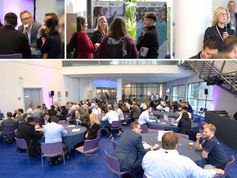Leadership how-to: Adapting to new business realities
Businesses have faced huge challenges in the past three years, pandemic, geo-political frictions and disruption, Supply Chain disruptions, super charged changes in consumer behaviors and priorities. These challenges can also be seen as chances to grow and reimagine how we organise around, create and deliver value. If businesses are flexible, open minded with a clear plan, they can grow in ways that help those up and down value chains and wider society.

The wider implications of growth
Growth in the business world is often measured by key performance indicators (KPIs), but its significance extends far beyond mere metrics. When businesses thrive, they have the potential to bring about significant positive changes within society.
With the action on climate change high on the agenda for many, progressive businesses will play a pivotal role in realising our ambitions. They generate the necessary financial resources that can be invested in green technologies, sustainable practices, and innovative solutions. In essence, when businesses grow with intention and strategy, they are not just increasing their bottom line; they're contributing to a better, more sustainable future for all.
Strategising between business creation and improvement
A nimble and proactive approach to building new businesses is becoming a mainstay of sustained growth. According to a recent study by McKinsey, a staggering 74% of companies that earmarked business creation as their primary growth strategy not only flourished but also outperformed their industry peers.
Navigating the energy transition
The shift towards sustainable energy is reshaping also businesses. To meet the ambitious 2050 net-zero emissions target, a considerable ramp-up in investments is needed. This means businesses should:
Pivot from high-carbon models towards greener, sustainable ventures
Re-engineer their cost structures and supply chains to be in tandem with energy transitions
Install frameworks to continually assess both risks and the windfalls of green opportunities
Cultivate a culture of adaptability and continuous learning
Engage board members in sculpting robust sustainability blueprints
Embracing technology in a post-pandemic world
The pandemic expedited a huge shift in business operations and ways employees and employers interact on a daily basis.Now, technology, particularly AI, is spotlighting a similar urgency. Given that 27% of businesses see a tangible fiscal impact from AI, it's imperative to:
Uphold and iterate on best practices in technology
Fully leverage the potential of cloud infrastructure
Direct funds towards transformative technological innovations
Prioritising human capital
Modern businesses are recognising that their workforce is as valuable as their financial assets. To harness this potential:
Evolve hiring processes to prioritise skills alongside traditional qualifications
Form synergies with educational institutions and ed-tech platforms for continuous employee development
Utilise the remote work model to tap into a wider, global talent pool, ensuring diversity and skill
Global adaptability in face of challenges
External challenges, like supply chain disruptions, have necessitated agile business adaptations. To fortify against such challenges, businesses are:
Incorporating dual sourcing to insulate against singular dependencies
Buffing up inventory to safeguard against unforeseen supply chain hiccups
Strategically relocating closer to consumer hubs
Spreading supply chains across nations to balance risk
Moving from strict vertical integration to prioritising key control junctures
Embedding a growth-centric ethos in leadership
The recent global crises spotlighted the essence of dynamic leadership. As the world recovers, businesses have a chance to:
Synchronise the goals of leadership teams with board directives
Cultivate a culture that encourages new ventures and novel thinking
Allocate capital efficiently to avenues that promise tangible returns
Prioritise human capital, understanding its pivotal role in holistic business success
In the face of recent global challenges, the business landscape is undergoing a transformational shift, with sustainability, technology, and human capital at its core. Companies are embracing new strategies, from diversifying supply chains and rethinking traditional business models to investing heavily in technological innovations, particularly AI. The underlying theme across these changes is the importance of adaptability, continuous learning, and an aligned vision from leadership teams. As businesses navigate this evolving paradigm, a harmonised approach prioritising sustainable growth, human capital, and adaptability will be essential to drive both economic and societal prosperity






Comments